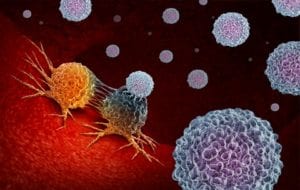New Mesothelioma Immunotherapy Treatment Reduces Tregs with Immunotoxin
 There is a new mesothelioma immunotherapy treatment in the works. This one is based on reducing the number of Tregs or regulatory T-cells around a mesothelioma tumor.
There is a new mesothelioma immunotherapy treatment in the works. This one is based on reducing the number of Tregs or regulatory T-cells around a mesothelioma tumor.
Tregs are an important part of maintaining balance in the immune system. They help protect people against autoimmune diseases like MS and lupus.
But in people with malignant mesothelioma and other types of cancer, too many Tregs can be a problem. Tregs respond to distress signals sent out by a tumor. They surround the tumor and protect it against attack from the immune system.
The goal of mesothelioma immunotherapy treatment is to reactivate the immune system to fight the cancer.
Developing a Mesothelioma Immunotherapy Treatment
Molecular biologists at the National Cancer Institute and Japan’s Fukushima University developed a toxin that reduces the number of Tregs.
The immunotoxin is called 2E4-PE38. It targets one of the protein distress signals that mesothelioma tumors send out. By killing the cells that express too much distress signal, they reduced the number of protective Tregs around tumors.
The discovery could lead to a new mesothelioma immunotherapy treatment.
How the Experiment Worked
The scientists used mice to conduct the experiment. They started by implanting tumors in lab mice. Some mice received mesothelioma tumors, some had breast cancer, and some got colon cancer.
Next, researchers injected some of the tumors with the immunotoxin. Other tumors were left alone.
“2E4-PE38 produced complete regressions of 85% of injected AB1 [mesothelioma] tumors, 100% of 66c14 [breast cancer] tumors, and 100% of CT26M [colon cancer] tumors,” states the report.
When the treated mesothelioma mice got another dose of mesothelioma cells, they did not develop new tumors. The treatment seemed to keep on protecting them.
Tregs Are the Power Behind This Mesothelioma Immunotherapy Treatment
The scientists think a dramatic reduction in Tregs surrounding the tumor is the reason the mesothelioma immunotherapy treatment worked so well. “The number of regulatory T cells (Tregs) was significantly reduced in the injected tumor but not in the spleen,” they write.
Fewer Tregs opened the door for the immune system to attack the injected mesothelioma tumors. Importantly, Tregs were still available in the rest of the body to do their protective job.
The report concludes that reducing Tregs around a mesothelioma tumor may jumpstart an anti-tumor immune response.
This report is just the latest to suggest that mesothelioma immunotherapy treatment may be the key to a cure.
The drug Keytruda (pembrolizumab) is the focus of several promising mesothelioma immunotherapy treatment trials. Other immunotherapy drugs being tested for mesothelioma include Opdivo (nivolumab) and Bavencio (avelumab).
Source:
Onda, M, et al, “Depletion of regulatory T cells in tumors with an anti-CD25 immunotoxin induces CD8 T cell-mediated systemic antitumor immunity”, February 13, 2019, Epub ahead of print, https://www.pnas.org/content/early/2019/02/12/1820388116





